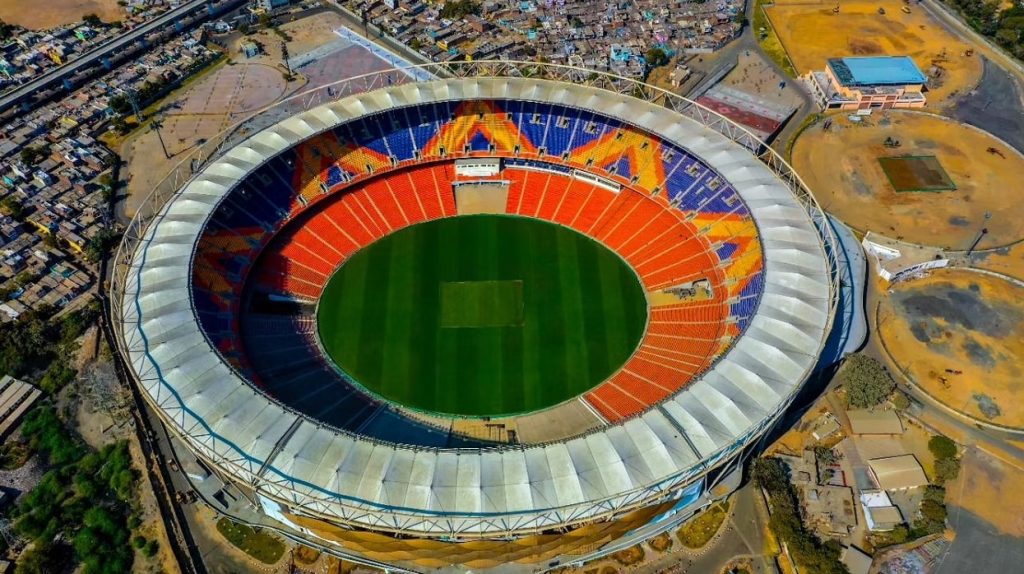The Narendra Modi Stadium in Ahmedabad, India, is not just the largest cricket stadium in the world by seating capacity—it’s also among the most strategically unique in terms of ground dimensions. With boundaries that can stretch further than most international venues, this arena offers a compelling mix of challenges and opportunities for players and teams.
As T20s, ODIs, and Test matches return to Ahmedabad, the length of its boundaries has become a talking point for commentators, analysts, and fans alike. In this article, we explore the boundary dimensions of the stadium in depth, how they compare with other venues, and how they influence gameplay across different formats.
1. Introduction to Narendra Modi Stadium
Located in the Motera district of Ahmedabad, the Narendra Modi Stadium was redeveloped and reopened in 2020. It replaced the old Sardar Patel Stadium and boasts a seating capacity of 132,000, making it the largest in the world.
Besides its grandeur, what sets the stadium apart is its variable boundary dimensions, which range from 60 to over 85 meters, depending on the pitch being used and the format of the game.
2. Average Boundary Lengths: Narendra Modi Stadium
Due to the large circular layout and multiple pitches across the square, the boundary sizes vary significantly from match to match. Let’s look at the general average dimensions used for international matches:
| Boundary Type | Minimum Length (m) | Maximum Length (m) | Average (m) |
|---|---|---|---|
| Straight | 70 | 78 | 74 |
| Square (Off & Leg) | 63 | 72 | 67.5 |
| Long-on / Long-off | 68 | 75 | 71.5 |
| Third Man / Fine Leg | 60 | 68 | 64 |
| Deep Midwicket / Cover | 72 | 85 | 78.5 |
Note: The ICC allows a minimum boundary length of 59.43 meters (65 yards) from the center of the pitch.
3. Comparison With Other Major Stadiums
Let’s see how Narendra Modi Stadium stacks up against other international grounds in terms of average boundary size:
| Stadium | Country | Avg. Boundary Length (m) | Type |
|---|---|---|---|
| Narendra Modi Stadium | India | 70–80 | Large, circular |
| Melbourne Cricket Ground (MCG) | Australia | 68–86 | Very large, oval |
| Eden Gardens, Kolkata | India | 65–75 | Medium-large |
| Lord’s, London | England | 65–80 | Irregular, sloped |
| Dubai International Stadium | UAE | 65–77 | Balanced |
| Wankhede, Mumbai | India | 60–68 | Small, batting-friendly |
The Narendra Modi Stadium ranks among the top 3 largest in terms of boundary sizes globally, especially square of the wicket.
4. Impact of Boundary Size on Match Play
a) T20 Matches
In T20s, small boundaries generally lead to higher scores. However, at Narendra Modi Stadium, the large square boundaries (sometimes 75–80 meters) make it challenging to clear the ropes, especially for cross-batted shots like pulls and cuts.
Key Observations:
- Teams often target straight boundaries, which are shorter.
- Bowlers use the ground’s size to vary pace and force mishits.
- Spinners bowl with wider lines to force batters to go square.
| Match Example | Format | Sixes Hit | Average Boundary Size |
|---|---|---|---|
| IND vs ENG, 2021 (T20I) | T20 | 12 | 72m avg |
| GT vs RR, IPL 2022 Final | T20 | 11 | 73.5m avg |
b) ODIs
In ODIs, the larger boundaries at Narendra Modi often lead to more running between the wickets. Players who can rotate strike and place shots smartly have an advantage.
Impact on Strategy:
- Power-hitters go for straight or inside-out lofts over cover.
- Captains prefer attacking fields with boundaries protected.
- Fast bowlers use short-of-length deliveries to exploit the long square boundaries.
| Match Example | Runs Scored | 4s/6s | Result Trend |
|---|---|---|---|
| IND vs AUS, 2023 (ODI WC) | 201/4 (target) | 16/5 | Bowling-dominant pitch |
| NZ vs ENG, 2023 | 282/1 | 27/10 | Flat pitch, smart batting |
c) Test Matches
In Tests, the large ground assists bowlers in containing runs and forces batters to rely more on technique. Longer boundaries lead to more catches in deep, fewer boundary balls, and more value for fitness and patience.
| Test Match | 4th Innings Score | Result | Key Factor |
|---|---|---|---|
| IND vs ENG, 2021 (Day-Night Test) | 81 & 112 | India won | Seam-friendly, big boundaries |
| IND vs AUS, 2023 | 480 & 175/2 | Draw | Flat pitch, hard to clear ropes |
5. Pitch Position and Boundary Variation
The Narendra Modi Stadium has 11 pitches laid across its square—5 black soil, 6 red soil—allowing curators to alter pitch positions. This affects boundary sizes significantly.
| Pitch Location | Square Boundary | Straight Boundary | Typical Match Format |
|---|---|---|---|
| Center of Square | 75–80 m | 70–74 m | Tests, ODIs |
| Towards Pavilion Side | 65–68 m | 75–78 m | T20s, IPL |
| Edge of the Square | 60–65 m | 75–80 m | T20s with more scoring |
6. Spectator Experience & Stadium Architecture
The vastness of the ground, with high seating stands and expansive playing area, offers a grand visual spectacle. From a batter’s perspective, even mistimed shots feel inadequate due to the sheer length of the outfield.
The design also features:
- Uniform sightlines for all seats
- Large LED screens with real-time boundary tracking
- Advanced drainage system, keeping the outfield fast but safe
7. How Players Adjust to Boundary Lengths
Batters:
- Focus on timing over power.
- Use gaps and twos rather than going aerial.
- Pick straight angles where boundaries are manageable.
Bowlers:
- Use boundary length for field placements (deep square, wide long-off).
- Deploy wide yorkers and slower balls in T20s.
- Encourage false strokes square of the wicket.
Fielders:
- Must cover more ground and be fit for longer throws.
- Boundary riders play a crucial role in cutting off runs and preventing sixes.
8. Boundary Evolution at the Stadium
| Year | Format | Average Square Boundary (m) | Notable Change |
|---|---|---|---|
| 2011 | ODI WC | 68 | Smaller ground pre-renovation |
| 2021 | T20I Series | 73 | New layout after rebuild |
| 2023 | ODI WC | 76 | Larger outfield, more grass |
Big Boundaries, Bigger Challenges
The Narendra Modi Stadium is more than a record-breaking venue by capacity. Its boundary dimensions offer a distinct character to matches played here. Bigger boundaries mean smarter cricket—power alone isn’t enough. Bowlers, batters, and fielders all must adapt to a more strategic game.
Whether it’s a high-stakes World Cup final or a fierce IPL clash, the ground’s size ensures that only the best-prepared teams prevail. In a cricketing world chasing sixes, Narendra Modi Stadium dares teams to think deeper—and play smarter.


